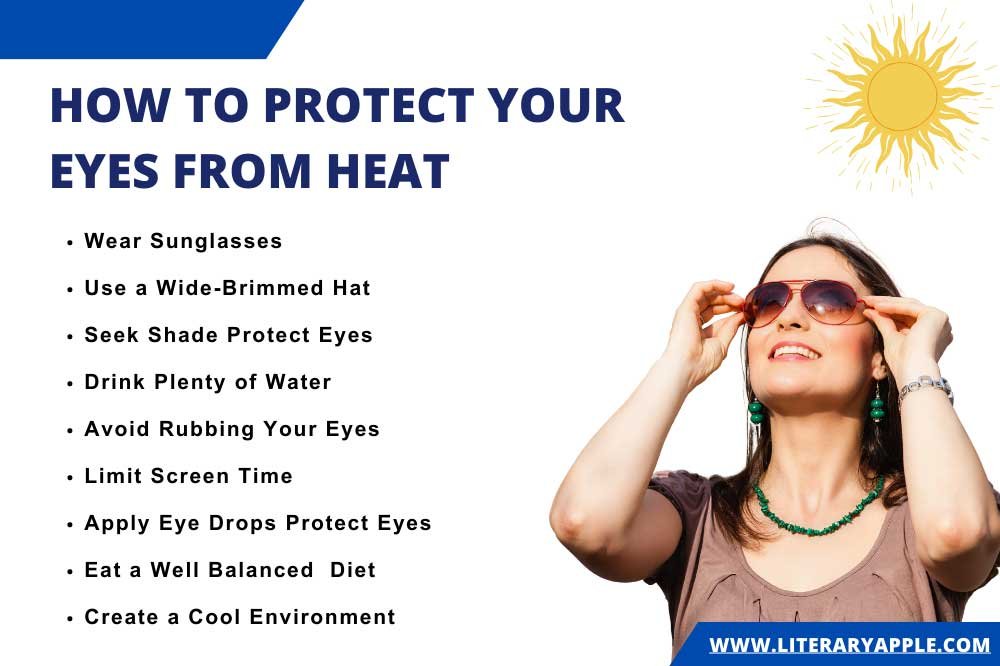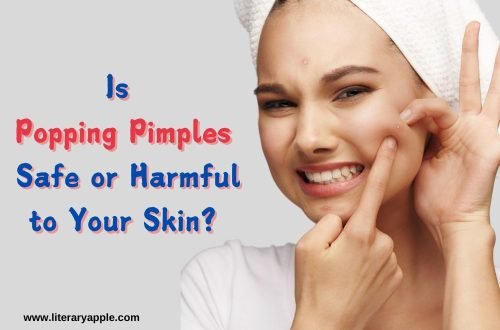How to Protect Your Eyes from Heat

How to Protect Your Eyes from Heat?
How to Protect Your Eyes from Heat: Essential Tips and Tricks
Your eyes are precious and sensitive organs that need proper care, especially during periods of intense heat. Prolonged exposure to heat can lead to various eye discomforts and even more severe conditions. By following a few simple guidelines, we can protect our eyes and prevent potential damage. In this article, we will explore effective strategies to safeguard our eyes from the harsh effects of heat.
Impact of Heat on Eyes
Excessive heat can cause a range of eye problems, including dryness, redness, irritation, and even sunburn on the surface of the eye, also known as photokeratitis. In summers, the risk of eyes infections increased due to excessive heat and contact of water with eyes. In the water, there are many pathogens, such as Acanthamoeba, which are a major cause of eyes infections.
Importance of Eye Protection
Taking proactive steps to shield our eyes from heat is vital for maintaining long-term eye health. By incorporating protective measures into your daily routine, you can reduce the risk of eye discomfort and more severe eye conditions caused by exposure to high temperatures. So, especially in summers, protect your eyes from heat. Wear sunglasses, lenses correctly, wear swimming goggles or diving mask and drink plenty of water.
Tips to Protect Your Eyes from Heat
Now let us explain some prevention tips and tricks that will help you to protect your eyes from heat.
Wear Sunglasses Protect Eyes from Sun Heat
Invest in high-quality sunglasses that offer 100% UV protection. These sunglasses will protect your eyes from dangerous UV rays. If you work outside, look for sunglasses with polarized lenses to minimize glare and ensure optimal eye safety. Polarized sunglasses reduce glare and you can easily see when you are in the sun.
Use a Wide-Brimmed Hat to Protect Eyes From Heat
Pair your sunglasses with a wide-brimmed hat for added protection. The hat will shield your eyes from direct sunlight and reduce the overall heat exposure to your face. If you spend more time outside during the summer, know that heat can be extremely damaging to the eyes. You should wear hats and polarized sunglasses.
Seek Shade
Seek shade or create your shade using umbrellas or canopies. Limiting direct sun exposure helps minimize the strain on your eyes and prevents sunburn.
Drink Plenty of Water to Protect Eyes
Did you know during summer, your body could be dehydrated, which can cause serious health issue? Your lenses can be weak and face weak eyesight. Proper hydration is essential for overall health, including eye health. Drink an adequate amount of water throughout the day to keep your body and eyes hydrated.
Avoid Rubbing Your Eyes
Resist the urge to rub your eyes, as it can lead to irritation and worsen any existing discomfort caused by heat. If your eyes feel itchy or dry, try using artificial tears or consult an eye care professional.
Limit Screen Time
Excess use of laptop of mobile phone can lead to a condition called eye strain. Headache, blurred vision, itchy eyes and light sensitivity are the common causes of eyestrain. Follow the 20-20-20 rule for electronic screens, recommended by the American Optometric Association.
Apply Eye Drops Protect Eyes
Using lubricating eye drops can help alleviate dryness and provide relief from eye discomfort. Consult an eye care specialist to find the most suitable eye drops for your specific needs.
Eat a Well-Balanced Diet
Maintaining a balanced diet rich in vitamins and minerals is crucial for eye health. Include foods high in omega-3 fatty acids, antioxidants, and vitamins A, C, and E to support optimal eye function.
Create a Cool Environment
Maintain a cool and comfortable environment by using fans, air conditioning, or other cooling methods. Lowering the temperature in your surroundings can reduce eyestrain and discomfort.
Understand UV Index and Sun Protection
Familiarize yourself with the UV Index, a numerical scale that indicates the intensity of UV radiation from the sun. Plan outdoor activities accordingly, aiming to minimize sun exposure during peak UV hours. Moreover, apply broad-spectrum sunscreen with an SPF of 30 or higher to your face and eyelids to provide additional protection against UV rays.
Opt for UV-Blocking Contact Lenses to Protect Eye
For individuals who wear contact lenses, consider switching to lenses that offer UV protection. These specialized lenses help filter out harmful UV rays while providing clear vision and comfort throughout the day. Consult with your eye care professional to determine the most suitable UV-blocking contact lenses for your needs.
Practice Eye-Friendly Habits
Besides wearing UV-protective eyewear, include other eye-friendly habits into your daily routine. Remember to blink regularly, especially when using digital devices, to prevent dry eyes and maintain visual hydration. Take frequent breaks from screen time to reduce eyestrain and fatigue, and ensure proper lighting in your workspace to minimize glare and optimize visual comfort.
Stay Hydrated and Nourished
Maintaining overall health and hydration is essential for supporting eye health and flexibility against UV damage. Stay hydrated by drinking an adequate amount of water throughout the day, and consume a balanced diet rich in antioxidants, vitamins, and omega-3 fatty acids. These nutrients help protect against oxidative stress and inflammation, which are associated with UV-related eye conditions such as cataracts and macular degeneration.
Schedule Regular Eye Checkups
Make it a priority to schedule routine eye exams with your eye care provider. Regular eye exams are essential for detecting early signs of UV-related eye conditions, such as cataracts, macular degeneration, and photo keratitis (sunburn of the cornea). Early detection allows for timely intervention and treatment, preserving vision and preventing further damage to the eyes.
Educate and Advocate
Take an active role in raising awareness about the importance of protecting eyes from UV radiation within your community. Share eye health tips and resources with friends, family, and colleagues, encouraging them to prioritize eye protection and adopt healthy eye habits. Advocate for policies and initiatives that promote UV safety in outdoor environments, such as providing shade structures in public parks and recreational areas.
By following these comprehensive guidelines and integrating UV protection into your daily lifestyle, you can significantly reduce the risk of UV-related eye damage and enjoy optimal eye health for years to come. Remember, your eyes are irreplaceable, so take proactive steps today to protect them from the sun’s harmful rays and preserve your vision for a brighter tomorrow.
Conclusion
Protecting your eyes from heat is crucial for maintaining optimal eye health and preventing discomfort and potential damage. By following the tips outlined in this article, such as wearing sunglasses, seeking shade, staying hydrated, and taking regular breaks from screens, you can safeguard your eyes from the adverse effects of heat and enjoy clear and comfortable vision.
Frequently Asked Questions
Can wearing sunglasses indoors protect my eyes from heat?
While sunglasses primarily shield your eyes from harmful UV rays outdoors, wearing them indoors can also provide some relief from bright indoor lights and minimize eye strain.
How often should I get my eyes examined?
It is recommended to have a comprehensive eye exam every 1-2 years, or as advised by your eye care professional.
Are all sunglasses equally effective in protecting against UV rays?
No, not all sunglasses offer the same level of protection. Look for sunglasses labeled as providing 100% UV protection to ensure adequate shielding from harmful rays.
Can I use any eye drops to alleviate dryness caused by heat?
Different eye drops cater to specific eye conditions. Consult an eye care specialist to determine the most suitable eye drops for your particular needs.
Is it safe to use a smartphone or tablet before bedtime?
The blue light emitted by electronic devices can interfere with sleep patterns. It is advisable to limit screen before bedtime to promote better sleep quality.
You Might be Interested In…
- Yoga for Migraine | Heal Headache
- Remove Ring from Swellen Finger
- Why You Should Avoid an Apple at Night?
- Lack of Sleep and Premature Skin Aging
- How to Remove Nail Polish?
- Amazing Health Benefits of Stair Climbing
- What You Should Know About Chewing Gum?
- Never Skip Your Breakfast!
- Is Honey Beneficial for Cough?


You May Also Like

Is Popping Pimples Safe or Harmful to Your Skin?
15/12/2024
Successful Weight Loss Tips That Actually Work
13/02/2022